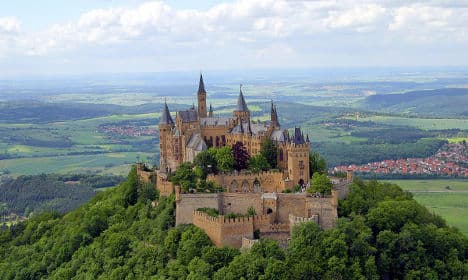The Local's guide to German castles

Kicking off a month focusing on Germany’s castles, palaces and crumbling ruins, The Local introduces 12 of the best – and one of the spookiest – royal locales.
From the ruins of Heidelberg, which American author Mark Twain loved to frequent, to the Disneyesque splendour of Neuschwanstein, swathed in the mystery of “Mad Ludwig’s” sudden death, castles across Germany don’t fit a particular cookie cutter shape.
The buildings’ purposes over the ages have been as diverse as their construction, and include a porcelain factory, a private office, a children’s summer camp, a hostel, government residences, Nazi headquarters and even wedding receptions.
Click here for a virtual tour of The Local's top thirteen castles
Some rivers flowing through Germany, such as the Rhine and Mosel, feature stretches where castles pop up along every second hill. In Rhineland-Palatinate, three medieval fortresses along the Rhine’s left bank have never been destroyed. One of the three, the Castle of Eltz, has been owned by the same family for over 800 years.
Germany originated as a patchwork of states, kingdoms and territories, which periodically fought each other, teamed up against common enemies, united and then faced off against each other again.
This political and military uncertainty created perfect conditions over the centuries for the construction of a huge range of castles, palaces and in-between buildings such as fortified monasteries. Although, even after the trend towards building the elaborate structures had subsided, rulers such as Landgrave Wilhelm IX in Hesse commissioned new buildings designed to resemble ancient ruins.
Legends and myths have, of course, grown along with the battlements, and while Schwerin’s parliamentary seat may not really have a small ghost roaming its halls, the island palace may still be worth a visit.
Erin Huggins
Comments
See Also
From the ruins of Heidelberg, which American author Mark Twain loved to frequent, to the Disneyesque splendour of Neuschwanstein, swathed in the mystery of “Mad Ludwig’s” sudden death, castles across Germany don’t fit a particular cookie cutter shape.
The buildings’ purposes over the ages have been as diverse as their construction, and include a porcelain factory, a private office, a children’s summer camp, a hostel, government residences, Nazi headquarters and even wedding receptions.
Click here for a virtual tour of The Local's top thirteen castles
Some rivers flowing through Germany, such as the Rhine and Mosel, feature stretches where castles pop up along every second hill. In Rhineland-Palatinate, three medieval fortresses along the Rhine’s left bank have never been destroyed. One of the three, the Castle of Eltz, has been owned by the same family for over 800 years.
Germany originated as a patchwork of states, kingdoms and territories, which periodically fought each other, teamed up against common enemies, united and then faced off against each other again.
This political and military uncertainty created perfect conditions over the centuries for the construction of a huge range of castles, palaces and in-between buildings such as fortified monasteries. Although, even after the trend towards building the elaborate structures had subsided, rulers such as Landgrave Wilhelm IX in Hesse commissioned new buildings designed to resemble ancient ruins.
Legends and myths have, of course, grown along with the battlements, and while Schwerin’s parliamentary seat may not really have a small ghost roaming its halls, the island palace may still be worth a visit.
Erin Huggins
Join the conversation in our comments section below. Share your own views and experience and if you have a question or suggestion for our journalists then email us at [email protected].
Please keep comments civil, constructive and on topic – and make sure to read our terms of use before getting involved.
Please log in here to leave a comment.